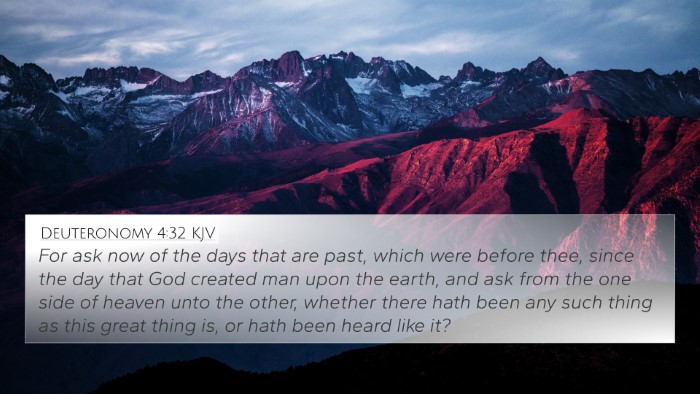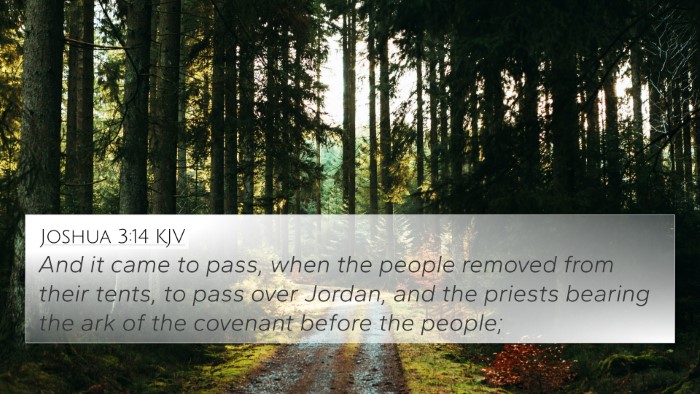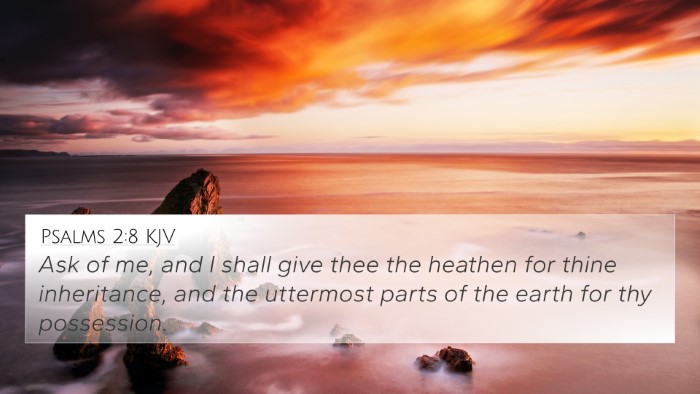Understanding Psalms 111:6
Psalms 111:6 states, "He has shown His people the power of His works, in giving them the heritage of the nations." This verse speaks profoundly to God's active engagement in history and His willingness to reveal His might and providence to His people. Through the insights of esteemed public domain commentators, we can explore the layered meanings of this verse, revealing its significance in the biblical narrative and its connections to other scriptures.
Commentary Insights
According to Matthew Henry, this verse emphasizes God's provision and the demonstration of His power through tangible acts. Henry notes that God has granted His people a "heritage" that symbolizes both a land and a spiritual inheritance, reflecting His faithfulness in fulfilling His promises. This divine heritage denotes a form of empowerment and responsibility entrusted to God's followers.
Albert Barnes connects this verse to the broader narrative of Israel's redemption and acknowledges the divine interventions that have shaped their history. He emphasizes that God's works are not merely miraculous; they serve as timely reminders of His continual guidance and support during challenging times.
Furthermore, Adam Clarke discusses the implications of God demonstrating His power through the "works" He performs. Clarke identifies these works as both natural and supernatural events, pointing to the conquest of nations and the establishment of Israel as a significant testament to God’s sovereignty. He elucidates that God’s acts are done in a manner to instill awe and reverence in His people.
Bible Cross-References
To enrich our understanding of Psalms 111:6, it is beneficial to explore various Bible verses that bear thematic connections or contextual relevance. Below are some notable cross-references:
- Exodus 15:16 - "Terror and dread fall upon them; by the greatness of Your arm they are as still as a stone..." This verse reflects God's mighty acts during the Exodus, similar to the power He shows in Psalms 111:6.
- Isaiah 63:9 - "In all their affliction He was afflicted, and the angel of His presence saved them; in His love and in His pity He redeemed them..." Here, the emphasis on God’s compassion connects to His powerful works as a heritage for His people.
- Deuteronomy 4:37 - "...because He loved your fathers, therefore He chose their descendants after them..." This reflects the theme of heritage and God’s ongoing relationship with His chosen people, which echoes Psalms 111:6.
- Psalms 78:54 - "And He brought them to His holy land, to this mountain, which His right hand had acquired." This verse mirrors God's provision and acts in establishing His people in their promised land.
- Joshua 21:43 - "So the LORD gave to Israel all the land of which He had sworn to give to their fathers..." This connection underscores God's faithfulness in fulfilling His promises to His people.
- Romans 8:17 - "And if children, then heirs; heirs of God and joint heirs with Christ..." This New Testament perspective provides a broader understanding of the concept of inheritance, rooted in God’s acts across the scriptures.
- Hebrews 2:8 - "You have put all things in subjection under his feet..." This reflects on the dominion given to God’s people, paralleling the theme of heritage and divine power.
Thematic Connections
The thematic connections across these verses highlight several core principles that resonate with Psalms 111:6:
- Divine Sovereignty: The consistent demonstration of God’s authority over nations and His people aligns with the powerful works referenced in Psalms 111:6.
- Heritage and Legacy: The idea of heritage encapsulates not only land but also spiritual blessings that come through faithfulness to God’s covenant.
- Power Demonstrated through History: This verse, together with its cross-references, signifies God’s active role in shaping history for His people.
- Faithfulness and Providence: The consistent theme of God being a faithful provider resonates through both the Old and New Testament references.
Conclusion
Psalms 111:6 is a rich verse reflecting the profound themes of God’s power, heritage, and active participation in the lives of His people. By engaging with public domain commentaries and undertaking a comprehensive Bible verse analysis through a series of connections and cross-references, we can derive a deeper understanding of its significance. Such explorations provide essential tools for Bible cross-referencing, enhancing our study and interpretation of scripture. Through this lens, we recognize the continuity of God’s promise and the heritage entrusted to believers which we can draw upon in our spiritual journeys.











